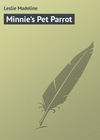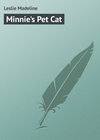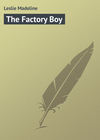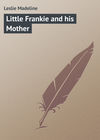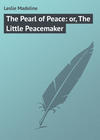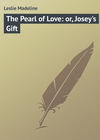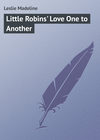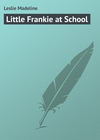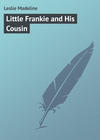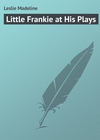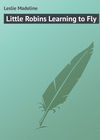Read the book: «Minnie's Pet Parrot», page 4
Presently one of the ladies related a precious bit of scandal then running through the town. She had scarcely finished her narration, when a shrill exclamation, —
“Possible!” in a tone of incredulity, came through the open doors.
The relator blushed deeply, but went on to prove that her statement must be true, while Mrs. Lee was so much amused, she was obliged to make a great effort to keep from laughing.
Again, as soon as the lady ceased, the exclamation, —
“Possible!” was repeated, as if in greater doubt.
This was too much of an insult, and the lady’s face kindled with anger.
Mrs. Lee quietly arose, saying, “Poll must come in and make her own apology for her rudeness;” and soon returned with the parrot clinging to her finger.
“Poll has a bad habit of interrupting conversation,” she said, playfully, “especially when she wishes to be invited to join the company, as at present.”
“Could that sound come from a bird?” inquired the lady; “I certainly thought it was a human voice.”
Many of the company tried to make Poll talk, but she declined for the present. After a while, however, when some witty remark was made which caused a general laugh, Poll laughed too, both loud and long, and then, as if perfectly exhausted with so much emotion, exclaimed, —
“Oh, dear! Oh, dear me!”
Two or three of the company had been invited to bring their children, and just at this time Minnie returned with her young friends, having introduced them to Jacko and her other pets.
The little girls gathered eagerly around Mrs. Lee, begging her to make Poll talk to them.
“Perhaps you would like to play a game of hide-and-seek with her,” cried Minnie; “she plays that real nice.”
“Yes, oh, yes indeed!” was the united response.
“Come, Poll,” called Minnie, extending her finger.
The parrot went at first with seeming reluctance, but presently entered into the spirit of the play, running after the children around the tables and chairs, laughing as merrily as any of them, and every once in a while repeating that curious “Oh, dear! Oh, dear me!” as if quite worn out.
Minnie then called the little girls into the next room, shutting the door behind them, when Poll, putting her head down close to the crack, seemed trying to listen to what they said. She well understood the game, however, for she presently called, “Whoop,” and then hid behind the door, to catch them when they came along, crying out, as she did so, “Ah, you little rogue!”
After this, she laughed so heartily that none could help joining her, – certainly the ladies could not; but all agreed she knew altogether too much for a bird, and was the most wonderful parrot they had ever seen.
CHAPTER V.
POLL AND THE BACON
Minnie went one day with her parents to a neighboring town, to visit some friends. She had no sooner alighted from the carriage, than she heard the familiar sound of a parrot’s voice.
“How do you do, miss?” cried the bird, arching its superb neck.
“I am very well, thank you,” answered Minnie, laughing. “How are you?”
“I’m sick, very sick.” The funny creature hung her head, and assumed a plaintive, whining tone. “Got a bad cough. Oh, dear!” (Coughing violently.) “I’m sick, very sick. Call the doctor.”
“I’m glad you have a parrot,” the little girl said to her companion, who stood by laughing. “I have one too; I should admire to hear them talk to each other.”
“Yes, I should; but mother thinks one such noisy bird is more than she can endure. Father had Poll given to him when he was a little boy, and he says he couldn’t keep house without her. She is very old indeed, and is often sick, though now she is only making believe. Father will tell you how many years she has been in the family.”
“There is nothing I like so well,” exclaimed Minnie, enthusiastically, “as to hear stories about birds and beasts.”
“Oh, I’ll get father, then, to tell you a funny one about Polly when he was a little boy. He knows all about parrots, because he once went to the country where they live.”
At dinner, Minnie was introduced to the gentleman, whom she regarded with great interest, on account of his fondness for the bird. No sooner was the dessert brought on the table, and the servants had retired from the room, than Lizzie Monson, her young friend, began.
“Papa, will you please to tell Minnie about Poll finding out who stole the bacon?”
Mr. Lee burst into a merry laugh, but presently said, —
“I warn you it is a dangerous business. Our little daughter has such a passion for birds and beasts, that if she once finds out you are a story-teller, she won’t let you off very easily.”
Mr. Monson gazed a moment into the sparkling countenance of the child, upon which her father’s remarks had caused the roses to deepen, and said, smilingly, “She does not look very savage. Any contribution I can make,” turning to the child, “to your stock of knowledge on your favorite subject will give me great pleasure.”
His bow was so profound and his smile so arch that the little girl could not help laughing as she thanked him, while Lizzie whispered, “Isn’t papa a funny man?”
“Ask your friend to come into the library,” called out Mr. Monson, as they were leaving the dining hall.
“Father, isn’t Poll sixty years old?” cried Lizzie, pressing forward to attract his attention.
“She has been in the family ninety years,” answered the gentleman, “and was then probably one or two years of age. It is astonishing how much she knows. Lizzie, run and open her cage, and bring her here.”
“She is, indeed, a splendid bird,” remarked Mrs. Lee, gazing with delight at her richly-tinted plumage. “See, Minnie, how her neck is shaded from the most beautiful green to the richest mazarine blue.”
“And look at her breast, mother; see those elegant red feathers!”
“The parrot,” said Mr. Monson, “is an insulated bird. Its manners and general structure, and the mode of using its feet, as described by naturalists, are different from any other bird. Mr. Vigors, Mr. Swainson, and others, consider parrots the only group among birds which is completely sui generis. A parrot will, by means of its beak, and aided by its thick, fleshy tongue, clear the inside of a fresh pea from the outer skin, rejecting the latter, and performing the whole process with the greatest ease.
“In climbing, I presume you have noticed, she uses her hooked beak as well as her feet; and in feeding she rests on one foot, holding the food to her beak with the other. Her plumage is generally richly-tinted, while in some varieties, like this, it is superb. In all kinds the skin throws off a mealy powder, which saturates the feathers and makes them greasy.”
“Please, papa,” cried Lizzie, “to tell about these birds as you saw them in their own country.”
“I suppose, Minnie,” continued the gentleman, “that you know this is not the home of your favorite bird. You never see them at liberty and flying from tree to tree, as you do the robin or bluebird.”
“Yes, sir, I know that. Uncle Frank was going to bring me another parrot from South America, but mother thought one was enough.”
“I quite agree with you,” said Mrs. Monson, enthusiastically, “I can scarcely be reconciled to the noise of one, rousing me at all sorts of unreasonable hours, and keeping up such a clatter through the whole day.”
“They are confined to the warmer climates,” the gentleman went on, “and are most abundant in the tropics. I have seen a flock of them resting in a grove of trees, chattering and talking like a company of politicians at a caucus. They are indeed very noisy, keeping together in large flocks, and feeding upon fruits, buds, and seeds. At night they crowd together as closely as possible, and hiding their heads under their wings, sleep soundly. As soon as the first ray of light can be discerned, they are all awake, chatting over the business for the day. First they make their toilet, and in this they assist each other, being very fond of pluming each other’s feathers.
“One peculiarity of this bird is, that he has but one wife, and never marries again. The pairs form lasting attachments, and when one dies the mate sometimes mourns itself to death. They make a kind of nest in the hollow trees, and there bring up their young. They belong to the scansorial order of birds; that is, they have two toes forward and two backward. Some of them fly slowly; but others wing their way with the greatest rapidity, and for a long period.”
“I think,” remarked Mrs. Lee, “they are the most intelligent of the feathered race.”
“Yes, naturalists decidedly give them that character. Poll sometimes seems almost too human; and then they are so quick to learn. Did you know, Minnie, that a parrot is considered an article of delicacy for the table?”
“O, no, indeed, sir! I wouldn’t eat a parrot for any thing.”
“Nor I; but among other rare and luxurious articles on the bill of fare, described by Ælian, as entering into the feasts of the Emperor Heliogabalus, are the combs of fowls, the tongues of peacocks and nightingales, the heads of parrots and thrushes; and it is reported that with the bodies of the two latter he fed his beasts of prey.”
Minnie’s countenance expressed great distress, as she quickly exclaimed, “O, how cruel!”
“Now, papa,” said Lizzie, “please tell her about Poll and the bacon.”
“Yes, I mustn’t forget that. When I was a little boy, Minnie, my father kept a country store, where all manner of things were exposed for sale. On one counter, in the genteel part, were cambrics, calicoes, and even silks for ladies’ dresses, while at the other end were barrels of sugar, boxes of cheese, and other groceries, and above them hung large legs of bacon.
